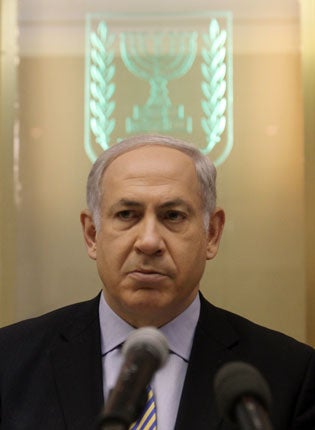Diplomats suspend protests for PM's visit

Your support helps us to tell the story
From reproductive rights to climate change to Big Tech, The Independent is on the ground when the story is developing. Whether it's investigating the financials of Elon Musk's pro-Trump PAC or producing our latest documentary, 'The A Word', which shines a light on the American women fighting for reproductive rights, we know how important it is to parse out the facts from the messaging.
At such a critical moment in US history, we need reporters on the ground. Your donation allows us to keep sending journalists to speak to both sides of the story.
The Independent is trusted by Americans across the entire political spectrum. And unlike many other quality news outlets, we choose not to lock Americans out of our reporting and analysis with paywalls. We believe quality journalism should be available to everyone, paid for by those who can afford it.
Your support makes all the difference.Israel's powerful trade union has stepped in at the 11th hour to prevent a Foreign Ministry wage dispute from overshadowing Israeli Prime Minister Benjamin Netanyahu's visit to the United States that begins today.
Disgruntled ministry workers – who say they receive half the pay of their peers at Defence but do the same amount of work, often in countries where their security is at greater risk – have been stepping up their protests, ditching their suits for jeans, and shirking diplomatic duties.
Israel's embassy in Washington was asked to support the protests by refusing to handle Mr Netanyahu's visit this week, but fortunately for the Prime Minister, the main trade union, Histadrut, intervened to avert an embarrassing showdown.
Although the domestic fires may temporarily be in abeyance, Mr Netanyahu does face a difficult meeting at the White House tomorrow with President Barack Obama, who will be searching for signs that the Israeli leader is serious about moving towards a peace deal with the Palestinians.
In particular, Mr Obama is expected to seek a commitment from Mr Netanyahu to extend a construction freeze in illegal Jewish settlements in the occupied West Bank after it expires in September. The Israeli Premier is under enormous pressure from his fragile right-wing coalition to resist Mr Obama at all costs.
Mr Netanyahu will hope to receive a more cordial reception than in March, when President Obama met him without a photocall, snubbed him to have dinner with his family and presented him with a list of demands aimed at building confidence with the Palestinians.
But as the Israeli Premier seeks to mend fences with his country's closest ally, the Israeli Foreign Ministry is doing its best to undermine the government's efforts at home precisely when it is in some need of diplomatic goodwill.
Israel is still smarting from an international backlash after its violent confrontation in May aboard a Turkish vessel that was leading a convoy to breach the Gaza blockade. Nine Turkish nationals died in the Israeli assault, fraying relations with a key Middle East ally.
The diplomatic wage dispute is now in its sixth month and in the past 10 days employees have started turning up for work in sandals and jeans, while visiting and outgoing officials have been left to fend for themselves.
"It hurts to do this, because we are very patriotic," said Hanan Goder, chairman of the ministry's diplomatic union. "When doctors are on strike, it hurts their patients; when teachers are on strike, it hurts the students; when diplomats are on strike, it hurts foreign relations."
The Russian Foreign Minister, Sergei Lavrov, was incensed last week when diplomatic protocol was ignored at a meeting with Israeli opposition leader Tsipi Livni. "There was no flag, and he was apparently very angry," said Yigal Palmor, Israeli foreign ministry spokesman. "At some point, there was also no red carpet."
The dispute also affected other visitors. The wife of the Estonian President Toomas Hendrik was left without a driver to take her back from a restaurant outside Jerusalem. Bulgaria's Foreign Minister, Nikolai Mladenov, had to call his embassy for a car to take him back after a visit to the Holocaust museum, Yad Vashem.
And the row has spread overseas, with foreign embassies refusing to make the necessary arrangements for visiting Israeli officials, forcing Uzi Arad, Mr Netanyahu's national security advisor, to shelve a visit to Moscow.
But Foreign Ministry employees agreed to back down temporarily during Mr Netanyahu's US trip. "We agreed to handle this visit as an exception," said Mr Goder. "There are major national interests to be discussed at this meeting."
In return for a temporary lull in hostilities, the head of the trade union has promised to intervene with the Finance Ministry to help mediate the pay dispute.
Join our commenting forum
Join thought-provoking conversations, follow other Independent readers and see their replies
Comments